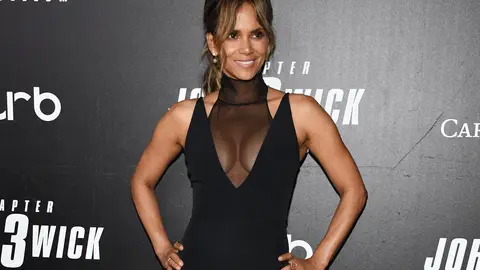Why It Matters Halle Berry Talked to Me—a Gay, Black Reporter—at “John Wick 3” Premiere

The third installment in the John Wick films starring Keanu Reeves defeated Avengers: Endgame this weekend for the top spot at the box office.
The film also stars Oscar-winning actress Halle Berry, who is winning over the internet—at least the blackest parts of it—for stopping to talk to the only two black reporters at the recent New York premiere of the film.
I was one of the two reporters.
Berry acknowledging me and What's the Buzz TV reporter Emerald Marie is not just newsworthy because it shows a celebrated actress being kind, but it also shines a spotlight on a larger conversation around the lack of diversity in newsrooms today.
When I arrived to the red carpet for the John Wick 3 premiere in Brooklyn, I noticed the lack of LGBTQ representation and people of color, despite the film starring Berry, Laurence Fishburne, Lance Reddick, and non-binary actor Asia Kate Dillon (Billions).
When Marie arrived, we discussed how we are often the only people of color at these events and how publicists often skip over us because, as we believe, they don't appreciate or see the value of our outlets and the stories we tell. Shortly after we discussed this, Berry's handler informed us that the actress wouldn't be able to talk to us due to a time crunch.
After Berry wrapped a broadcast interview, her publicist ushered her down the carpet, but Berry turned back to us and said, "I gotta see my brother though," and came back to speak with us.
Before the clip ends, you can hear me asking Berry about Boomerang—the television series, based on her 1992 movie, that she brought to BET with Lena Waithe. The series is quite groundbreaking for bringing intersectional queer and black storylines to a channel like BET. Stories about shows like Boomerang aren't being told in mainstream outlets, but they matter to marginalized communities. That's why it's so important for outlets like Logo to be present, and that's one of the many reasons it's important we are not skipped.
Our stories, our representation, and our lives matter.
As Berry herself said while presenting Waithe with a GLAAD Award for writing Master of None's coming-out episode, “You cannot underestimate the power of seeing yourself on the screen. It makes you feel legitimate and included, and helps other people understand who you are and where you come from."
And that's how Berry made me feel when she came back to speak to me at the premiere of her film.
And now some facts...
According to a 2018 Pew report, newsroom employees are more likely to be white and male than U.S. workers overall.
"More than three-quarters (77%) of newsroom employees—those who work as reporters, editors, photographers and videographers in the newspaper, broadcasting and internet publishing industries—are non-Hispanic whites, according to the analysis of 2012-2016 American Community Survey data."
And here's what that looks like as documented by Pose star Indya Moore, who called out the only black woman among photographers at this year's GLAAD Awards in New York.
I know someone reading this is probably asking why any of this matters. Why does it matter if there is diversity in newsrooms, on red carpets, or anywhere for that matter? I'll just talk about newsrooms.
Diversity in newsrooms creates diversity in the stories told. This includes the stories told about issues that matter to you, your black neighbor, the trans kid down the block, and so forth and so on. Fair, accurate, and inclusive representation matters—especially in the climate we are living in. Lack of diversity means certain stories will continue to go unreported and news analysis will continue to be unbalanced.
Here's a great example of this published by NPR in 2017:
A September 2016 piece by Lonnae O'Neal in The Undefeated, a site that covers how sports, race and culture intersect, described how NFL Network reporter Steve Wyche—one of the country's leading African American national sports reporters—covered the story of Colin Kaepernick's refusal to stand for the national anthem as an act of protest. His refusal, Wyche learned, formed part of a larger outcry over police violence against black men and women. Initial reports by other outlets focused on Kaepernick as divisive and a potential distraction in the locker room. For O'Neal, who analyzed the coverage with a racial lens, the Kaepernick story raised questions "about why the country is more brown than ever but mainstream journalism is so white."
At a later John Wick premiere, Berry said she'll always make time for the press.
Hopefully other public figures will make the same promise—especially when it comes to ones telling the stories not being told by mainstream outlets—while newsrooms figure out this persistent lack of diversity problem.





